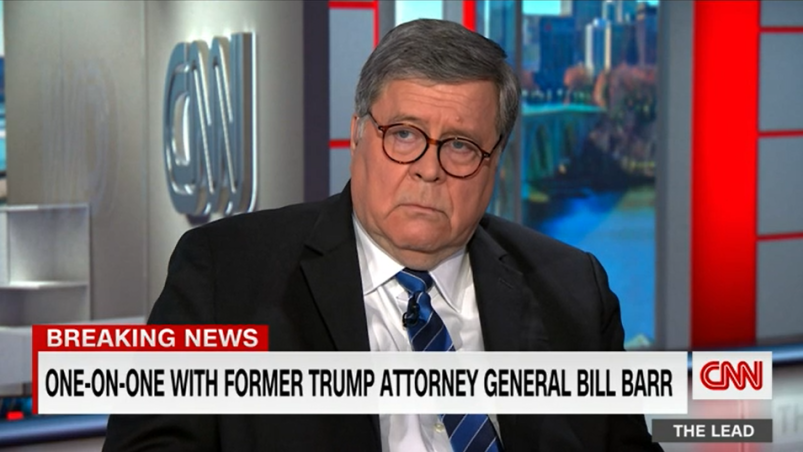Former Attorney General Bill Barr has a book out detailing his time in the Trump administration, and with it, he’s launched a full on historical revisionism campaign, telling Americans to believe him, now, rather than their lying ears in 2020.
It amounts to a whiplash-inducing turn for one of the most prominent voices to sow doubt about the security of the 2020 election — behind the former president himself.
Barr spent months making misleading and outright false statements about voting by mail during the 2020 presidential campaign, well before Donald Trump’s attempt to seize a second term after his loss to Joe Biden. And Barr was following the lead of the President, who relentlessly attacked and lied about mail-in voting as early as March and April of 2020 (right after Trump requested his own mail-in ballot, of course), after it became clear that the COVID-19 pandemic would change the way Americans vote.
As states across the country expanded their mail voting rules to accommodate the danger of in-person virus transmission at polling places — and as Trump’s campaign fought against the trend in court — Barr was instrumental in pushing the administration’s false line that widespread mail-in voting would lead to widespread fraud and should make Americans skeptical of the 2020 election. (Experts would ultimately describe the 2020 election as among the most secure in U.S. history.)
Now, estranged from the former president, Barr is trying to rewrite history.
In an interview with CNN’s Jake Tapper on Sunday, for example, Barr said of his position in 2020: “I also was not generally attacking mail-in, but universal mail-in ballots, where they send out the ballots to the people on the voting rolls.”
“With these practices in place, whether or not fraud occurs, people are going to think there was fraud,” he added later, referring to mail-in voting and so-called “ballot harvesting.” “One of the problems we have persuading people that this was a fair election is their concern about those kinds of practices.”
The statements couldn’t be further from the truth: Barr attacked mail-in voting unconditionally, and he was responsible for persuading people that the election would not been fair.
In June 2020, for example, Barr made the wild claim that “there are a number of foreign countries that could easily make counterfeit ballots, put names on them, send them in. And it’d be very hard to sort out what’s happening.” Trump quickly repeated the claim to millions on Twitter.
Was there evidence for this? Had it happened before in any noticeable numbers? No: It was just “logic,” Barr eventually said. “Most things can be counterfeited,” he added.
Or, take his interview with the columnist John Kass in September 2020: Barr called mail-in ballots a “terrible danger” before falsely saying that mail-in ballots weren’t secret.
“There’s no more secret vote with mail-in vote,” Barr claimed to Kass.
He repeated the same false claim the following day on an official trip to Phoenix, asserting that, when voters use mail-in ballots, “there’s no more secret vote, there’s no secret vote.”
“Your name is associated with a particular ballot,” Barr said. “The government and the people involved can find out and know how you voted. And it opens up the door to coercion.”
Barr cited the uncertainty (fueled by himself, Trump and others) about the security of mail-in voting to spread doubt about the election results before the presidential race was over, telling Kass that “[Democrats] are creating an incendiary situation where there’s going to be loss of confidence in the vote, it’ll be a close vote.”
“People will say, ‘The President won Nevada — oh, wait a minute! We just discovered a hundred thousand ballots, every vote must be counted!'”
Today, Barr’s role in the election is largely relegated to a single-sentence statement in December 2020, when he contradicted Trump and said “to date, we have not seen fraud on a scale that could have effected a different outcome in the election.”
That, and a generous media tour before and during this recent book promotion, have allowed the former attorney general’s own misleading and false statements about mail-in voting to mostly escape scrutiny.
But the evidence of his campaign against mail-in voting, and more broadly against Americans’ faith in the democratic process, is overwhelming.
Perhaps the most explosive example Barr employed in 2020 came during a CNN interview: “We indicted someone in Texas,” He said. “Seventeen hundred ballots collected from people who could vote, he made them out and voted for the person he wanted to.”
No part of that was true: The person in question faced state charges, not federal ones. And the defendant did not fill out 1,700 ballots however he wanted, but rather a single ballot. The DOJ blamed the mix-up on “an inaccurate summary about the case” that Barr had received.
Tapper brought up that case on Sunday.
“Do you bear any responsibility for all the people out there that thought that there was going to be all of this widespread voter fraud, given the fact that you were very vocally sounding the alarm based on theories and bad information?
“Not at all, I stand by all of that,” Barr said.







Barr is a liar and he was willing to work for trump. That’s really all I need to know.
But the headline with this article is kinda misleading. I see the words “his own campaign” and that leads me to think Barr is running for some office or other. Which apparently he is not.
Campaign, in this context, is synonymous with effort or attempt.
Barr is also synonymous with ‘self-dealing hypocrite’.
Barr is a fraud that wants to make money by selling books. Don’t give this man once cent of your money.
Including Attorneys General, it would appear.
Karma, Karma, Karma, come on lean on him. You come and make him go away.